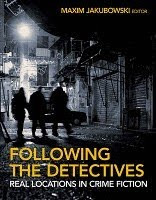Here's a post from last year that has it roots in crime and explains why "language changes" is no reason to use "partner" as a verb, "transparency" to mean "openness," or "they" as a singular.
==================
Monday's post contained the following, from Eric Partridge's
Origins: A Short Etymological Dictionary of Modern English:
"1. Crime, adopted from OF-F, derives from L crimen, *that which serves to sift (hence, to decide), decision, esp a legal one, hence an accusation, finally the object of the accusation—the misdeed itself, the crime ... "
The next day a sentence came to my attention in which a buyer "could not ... pay the ...
price tag" for an item, emphasis mine.
Now, reporters love to write
price tag for
price, presumably because they think it gives their writing colloquial zing. The affectation is superfluous, except in such constructions as
this:
"Juventus slap £53m price tag on Man United, City, Chelsea and Arsenal target Paul Pogba."
There,
slap works with
price tag to create a vivid image. The examples I generally remove from the stories, though, are on the order of:
"Finally, there's a paragraph that amounts to an explanation of just what makes for a $24 hamburger, the price tag for Harvey's product."
in which
tag is unnecessary, but easily removed with damage neither to the sentence's rhythm or sense nor to the writer's pride. But "pay the price tag" suggests a shift, in which the writer imagines
tag, rather than
price, as the object of
pay.
"Pay the price tag" is painful to me, but then, the writer in question may have seen few price tags in her life and, with the spread of online shopping, will likely see even fewer in the future. It is not out of the question that in five, 50, or 100 years, the
tag in
price tag will lose any relevance to what people see every day. But that does not mean the word will disappear. It could ease into a new function, the way
crime acquired its current meaning. In five, 50, or 100 years, literate speakers and readers, if any of the latter remain, may speak without embarrassment of "paying the price tag" or even "paying the tag." But not as long as I have any say in the matter.
***
I thought of titling this post "The hell with climate change," which might be an example of change something like what I discuss here, in which one word replaces another as speakers and writers lose contact with an expression's original meaning. "
To hell with ... " makes much more sense, doesn't it? But how many people would write it that way?
© Peter Rozovsky 2014 Labels: editing, Eric Partridge, language, language change, miscellaneous, reference, things that drive me nuts
 Our small gang had set out for a late lunch and agent's party at Bouchercon when we met what appeared to be a body of vestal virgins delivering pizza.
Our small gang had set out for a late lunch and agent's party at Bouchercon when we met what appeared to be a body of vestal virgins delivering pizza. "Have you seen a bride?" one of them asked me.
"Have you seen a bride?" one of them asked me. Later we saw a banquet setting up at the restaurant where we'd gone for the lunch/agent's shindig — a wedding reception, perhaps? — but no bridal party.
Later we saw a banquet setting up at the restaurant where we'd gone for the lunch/agent's shindig — a wedding reception, perhaps? — but no bridal party.













EjQPw~~_35.JPG)


























